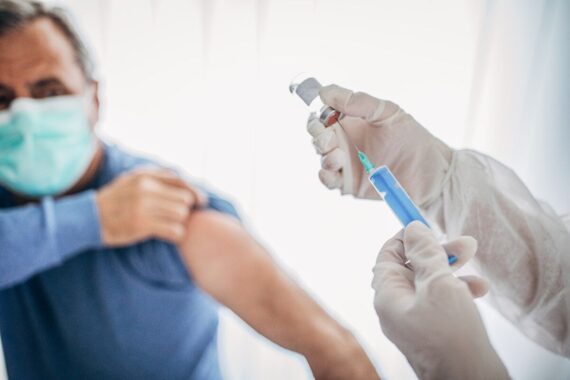The UK will shortly run out of the smallpox vaccine being used to prevent the spread of monkeypox, it has emerged.
Internal NHS England communication suggests the country is likely to exhaust supplies in the next 10 to 20 days with just 8,300 doses left in the UK and most of those earmarked for vaccination efforts in London.
It is understood there will be a delay of almost a month before the next supplies arrive in late September.
Only one vaccine is approved for the prevention of monkeypox among groups most at risk – a third-generation smallpox vaccine known as MVA-BN or Imvanex produced by Danish company Bavarian Nordic.
Sexual health services have been leading the roll out of smallpox vaccination to those at risk of monkeypox since July.
Health officials have recommended that some gay and bisexual men at higher risk of exposure to monkeypox should be offered vaccines to help control the recent outbreak of the virus.
The British Association for Sexual Health and HIV (BASHH) confirmed the supply issues, which were first reported by the Guardian to Pulse.
BASHH president Dr Claire Dewsnap said: ‘By current estimates, only 8,300 vaccines remain available, with 5,000 earmarked for London, where demand has been the greatest – making it likely that the remaining number of vaccines will run out in approximately 10 to 20 days, leaving a gap in supply until the next shipment arrives in September.
She added: ‘Whilst we welcome the Government’s early move to procure doses of the vaccine, recent figures have shown that there is an insufficient supply of vaccines to meet demand and that a significant number of people eligible for vaccination against monkeypox are yet to be vaccinated.
‘BASHH estimates that 250,000 doses of vaccine must be procured in order to vaccinate approximately 125,000 eligible people, yet the government has only procured over 100,000 to date.’
Dr Dewsnap also said as well as supply challenges, the current vaccination roll out had been too slow, ‘hampered by a lack of centralised leadership to coordinate across the various responsible agencies and providers’.
Earlier this month, an update to the Green Book said when supplies are limited, vaccination of confirmed monkeypox cases are not recommended.
It is unknown whether prior infection protects against future monkeypox infection but based on experience with smallpox, ‘it seems likely that reinfection will be unusual, particularly in the short term’, the update said.
‘Although previous monkeypox infection is not a contra-indication to vaccination, in a situation of constrained vaccine supply, it is therefore recommended that vaccination of confirmed cases is deferred.’
It continues: ‘If supply allows, vaccination may be considered in those at ongoing risk once fully recovered.’
As of the 8 August, there have been 2914 confirmed and another 103 highly probably cases of monkeypox in the UK, 2883 of which are in England.
UKHSA said while data suggests the outbreak seems to have slowed more cases are being seen every day.
Dr William Welfare, incident director at UKHSA, said: ‘While anyone can get monkeypox, the majority of monkeypox cases in the UK continue to be in gay, bisexual and other men who have sex with men, with the infection being passed on mainly through close contact in interconnected sexual networks.
‘Please continue to be aware of symptoms, including rashes and blisters, particularly if you have recently had a new sexual partner.’
NHS England recently urged patients not to visit their GP or A&E department if they have monkeypox symptoms.
Instead, patients have been told to contact their local sexual health clinic, or phone 111, and limit interactions with other people.
Pulse October survey
Take our July 2025 survey to potentially win £1.000 worth of tokens













